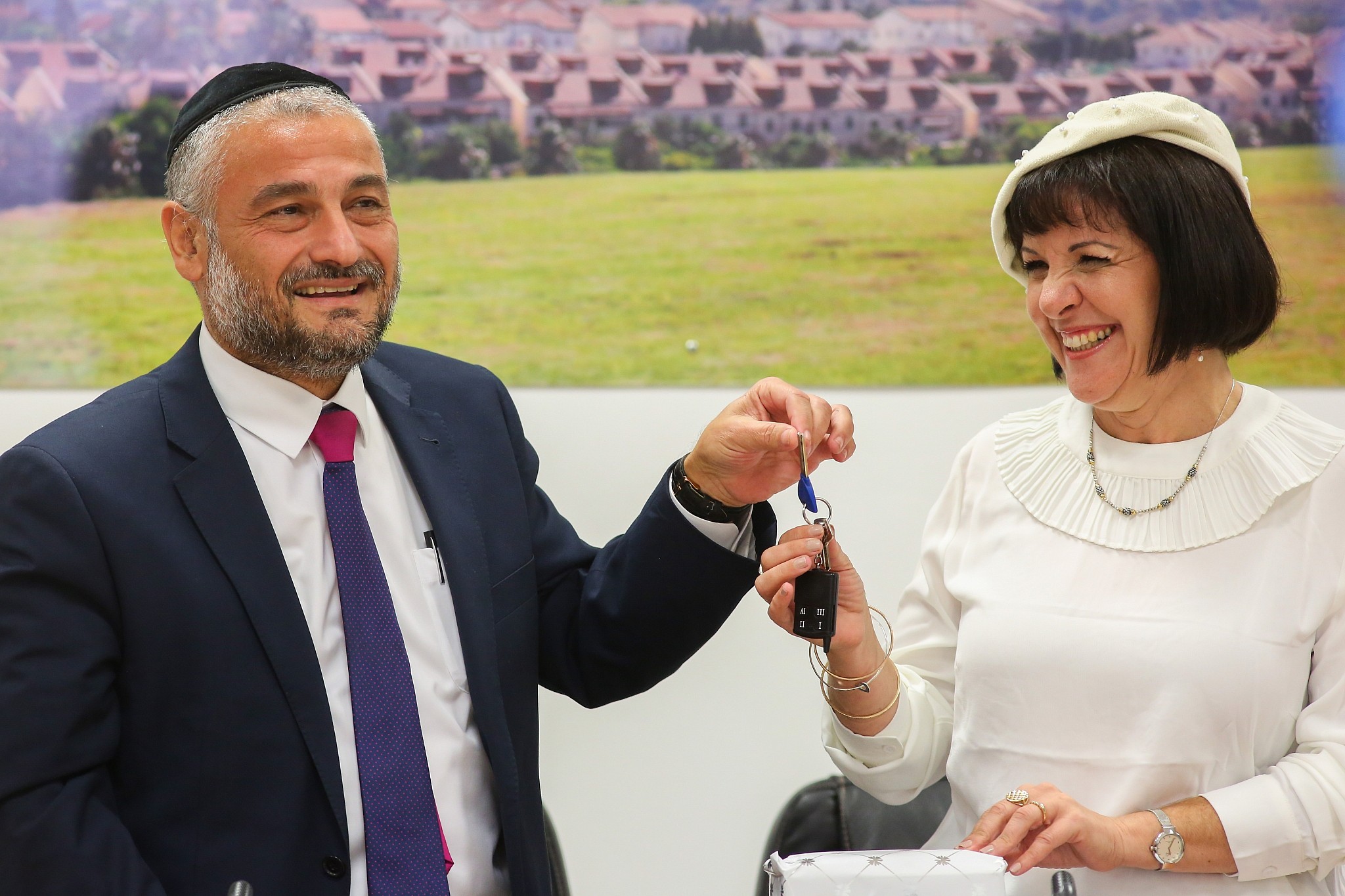The neighborhood under discussion, Neve Shamir, is under advance stages of construction. It is designated for the general population, i.e. national-religious and secular Jews, as opposed to the neighborhoods of Beit Shemesh which are designated for charedim. The streets were originally named after the months of the year. But the (national-religious) mayor, Dr. Aliza Bloch, wanted to rename them after various heroes of modern Jewish history, including women such as Anne Frank and Sarah Aaronson. The charedi city councilors protested, reportedly over the appearance of women's names. And so the women's first names are not being printed; the streets will simply be called Rechov Frank, Rechov Aaronson, and so on.
Some people who are uncomfortable with bad PR for charedim (or for the mayor) are claiming that the entire story is being misreported and that it is Fake News. They say that it's just a matter of a design/utility choice of having a single word for the main street sign, and that the women's names are not at all being erased, but rather are printed in smaller letters below, which is also happening with the men's first names.
Alas, this is not true. As the mayor's spokesperson confirmed, the charedi councilors did indeed voice opposition to the women's names. The compromise reached was for all the names, both men and women, to be written in full only in small letters, and for the primary street name to be only the last name, for both men and women.
The charedi community
frequently erases the names of women as well as their pictures. Wedding
invitations are from "Rabbi Beryl Shmeryl and Wife," without the wife
actually getting a name. And articles by female charedi journalists are often printed without their first names appearing
What about the fact that there are streets in charedi neighborhoods in Jerusalem named after Biblical women, with no objection ever voiced? That's no different from the fact that the Torah itself mentions names of women. It's not a relevant point to charedim who are opposed to printing women's names. They're opposed to the printing of names which represent women with identities, with faces, who they see as posing a challenge to the male mind, not to names of abstract women from thousands of years ago.
Now, it goes without saying that this recent charedi development is wrong. It's harmful. Any questionable alleged tzniyut benefits are vastly outweighed by the damage that it causes, in all kinds of ways.
But that's not what's under discussion. The topic being debated is whether the mayor should have accommodated this charedi demand. And that's a much, much more difficult question to answer.
To refresh your memories: For ten years, the city of Beit Shemesh was under the control of a charedi administration which had three enormous flaws. One, it was completely incompetent. Two, it was corrupt (one of the deputy mayors explicitly asked me to bribe him). Three, it tried to "charedify" the city as much as possible.
After ten years, something extraordinary occurred. The elections were won by someone that many of us thought possessed absolutely zero chance of winning: Dr. Aliza Bloch, a national-religious woman. This is one of the great miracles of Jewish history! (I told her as much when I had the honor of hosting her in my home for Shabbos last year.)
Since Dr. Bloch's victory, the governance of the city has improved in myriads of ways. But many of those in the national religious camp, while preferring Dr. Bloch over the previous administration, are disappointed in certain aspects of her approach - in particular, with regard to charedim. Basically, Aliza Bloch decided to incorporate the charedi municipal parties into her coalition, and accommodate their wishes in various ways.
From the perspective of many in the national-religious camp, Dr. Bloch has sold them out in order to increase her political power. But from the perspective of Dr. Bloch and her supporters, she has engaged in necessary and valuable compromises in order to create unity, increase the chances of her governance lasting more than one electoral cycle, and ultimately effect long-term benefit for the city.
I'm not going to weigh in on who I believe to be correct. Partly, this is because I don't actually know what to think. But I think that it's certainly important to be aware of both sides of the issue.
Personally, I find it hard to believe that the charedi city councilors even particularly care about the women's names on the signs. They're probably more bothered by the very fact of naming streets after non-charedi heroes. And fundamentally, it's probably more about basic issues of power and control. After all, these streets are not even in charedi neighborhoods, which have their "Rav Elyashiv Streets" and other streets named after charedi gedolim (without regard to whether these are offensive to non-charedim). It's probably not anything to do with women; it's all about exerting charedi influence on the city and limiting non-charedi influence.
I admire the idealism and passion of those who don't want to give an inch to offensive charedi demands. But such people would never become mayor of a charedi-majority city, and would be very limited in their ability to effect change. Aliza Bloch, by virtue of compromise, is able to be more effective at creating change.
At the same time, that doesn't mean that people shouldn't complain when the mayor gives in to charedi demands. It's important for both the mayor and the public to see that giving in does cause pain to the non-charedi community. But, at the same time as complaining, people should recognize that the mayor has to engage in a certain amount of compromise. And if agreeing that first names will be omitted from the large street sign, and written in full only in small letters below, then perhaps that is a worthwhile trade for naming streets after non-charedi heroes and being able to continue as a non-charedi mayor in a majority chareidi city. (Note that I say "perhaps".)
Anyway, one local resident suggested that "streets should be named for trees or animals, instead of names of people that are hard to pronounce, remember, and type into Waze." Personally, I agree. I for one would love to see "Nigerian Red Uromastyx Lizard Street."
See too these posts:











